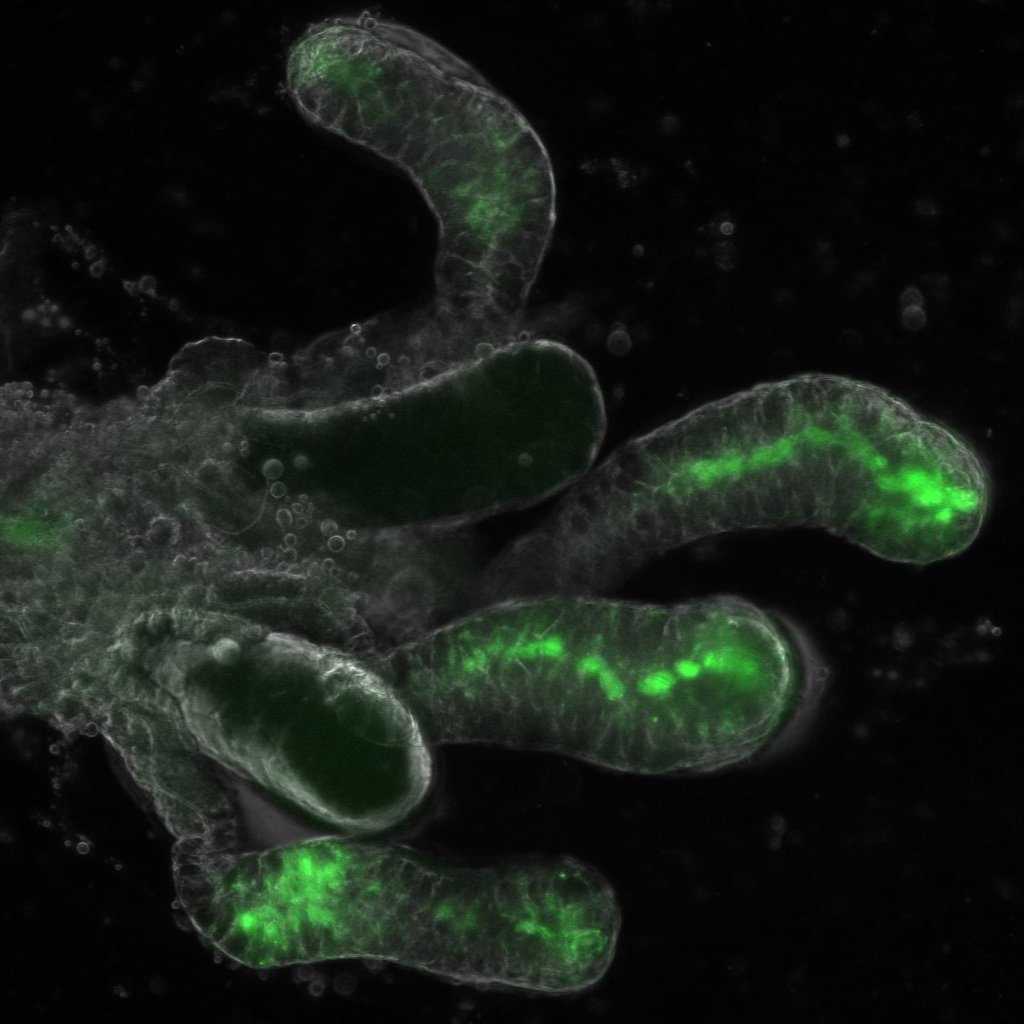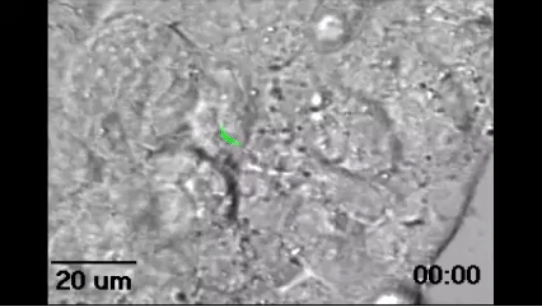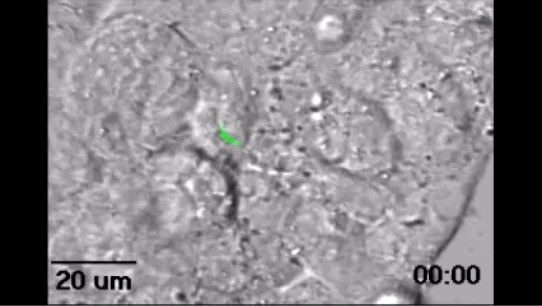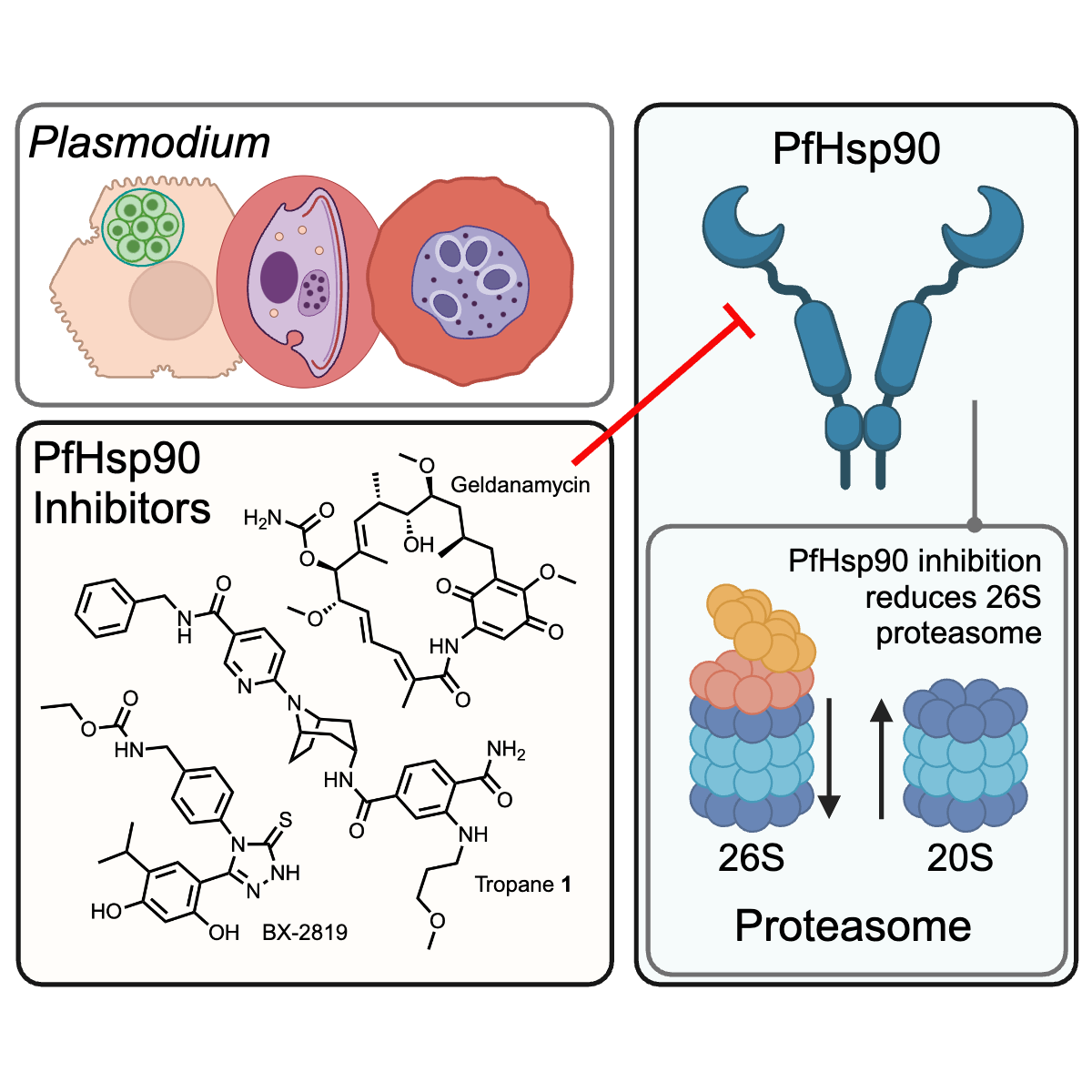The Derbyshire Lab
Duke University
Departments of Chemistry,
Molecular Genetics and Microbiology,
and Cell Biology
Departments of Chemistry,
Molecular Genetics and Microbiology,
and Cell Biology
We are committed to fostering a culture of respect, professionalism, and opportunity. We value the experiences and perspectives that each individual brings, as they contribute to our shared success and innovation.



Image of mosquito salivary gland with GFP parasites by Dr. Dora Posfai, Duke University
Parasites infect billions of humans each year and cause several major diseases, largely in underserved populations in developing parts of the world. Malaria, in particular, is a leading cause of deaths worldwide, and its causative agents, Plasmodium parasites, are crafty as they have successfully eluded our defense mechanisms since they first infected us tens of thousands of years ago.
The Derbyshire Lab uses chemical tools and biological methods to uncover novel aspects of malaria parasite biology with the ultimate aim of identifying druggable targets. Projects range from developing assays for phenotypic and target-based screens – forward and reverse chemical genetics – to dissecting biological pathways and identifying small molecules with potential therapeutic value. Our interdisciplinary collaborative program integrates both novel and established methods to address target identification, which is one of the most challenging aspects of malaria drug discovery. Our lab’s goal is to globally interrogate parasite biology by using chemical biology, molecular biology, biochemistry and parasitology.



Schroeder, E.A., Colón, I.C., Petruziello, P.E., Derbyshire, E.R.** Host Sphingolipids Support Plasmodium berghei Liver Stage Development. mBio 2025 16, e0167525.
Truong, A., Hu, R., Quan, B., Bailey, M.A., Schroeder, E.A., Sylvester, K., Neveu, G., Kafsack, B.F.C., Fitzgerald, M.C., Derbyshire, E.R.** Covalent Inhibition of Plasmodium falciparum Ubc13 Reveals Translational Control by K63-Ubiquitin. iScience 2025, 28, 112545.

Mansfield, C.R., Quan, B., Chirgwin, M.E., Eduful, B., Hughes, P.F., Neveu, G., Sylvester, K., Ryan, D.H., Kafsack, B.F.C., Haystead, T.A.J., Leahy, J.W., Fitzgerald, M.C., Derbyshire, E.R. Selective Targeting of Plasmodium falciparum Hsp90 Disrupts the 26S Proteasome. Cell Chemical Biology 2024, 31, 729-742.
Ong, H.W., de Silva, C., Avalani, K., Kwarcinski, F., Mansfield, C.R., Chirgwin, M., Truong, A., Derbyshire, E.R.,** Zutshi, R.,** Drewry, D.** Characterization of 2,4-dianilinopyrimidines Against Five P. falciparum Kinases PfARK1, PfARK3, PfNEK3, PfPK9 and PfPKB. ACS Medicinal Chemistry Letters 2023, 14, 1774-1784.
Professor
Graduate Student
Graduate Student
Graduate Student
Graduate Student
Undergraduate Student
Undergraduate Student
Undergraduate Student
Undergraduate Student
Undergraduate Student
Sarah Valette joins the lab from the MGM department. Welcome!
Dr. Justin Davis joined North Carolina Wesleyan University as an Assistant Professor of Biology. Congratulations Professor Davis!
Michael Chirgwin is selected for the Paul M. Gross Fellowship! Congrats!
Emily Derbyshire is elected as a 2024 AAAS Fellow!
The lab welcomes Chelsea Gan, Caroline McSwain (BSURF) and Caitlyn Hughes (Amgen Fellow) as undergraduate summer researchers!
Dr. Erin Schroeder is starting her new position at Merck. Congrats!
Congrats to Dr. Anna Truong for successfully defending her dissertation!
Congrats to our graduating undergraduate researchers Kaitie Choe, Isabel Colon, and Porter Petruzziello!
Isaac Nelson joins the lab from the Cell & Molecular Biology Program. Welcome!
Congrats to Dr. Erin Schroeder for successfully defending her dissertation!
Anna Truong’s paper on uncovering Ubc13-dependent processes in malaria parasites is accepted to iScience. Congrats!
Eads Family Professor of Chemistry, Molecular Genetics and Microbiology, and Cell Biology
Duke University
3218 French Family Science Center
124 Science Drive
Durham, NC 27708
Office phone: 919.660.1511
Email: emily.derbyshireATduke.edu
Lab: 5324 French Family Science Center
Lab phone: 919.684.0413

– Prospective postdoctoral fellows please email an application to Emily.
– Prospective graduate students please consider Duke’s graduate programs in Chemistry, Molecular Genetics and Microbiology and Cell and Molecular Biology.
– Prospective undergraduate students should contact Emily.
SOCIAL